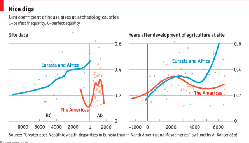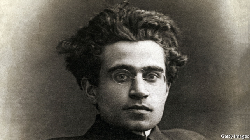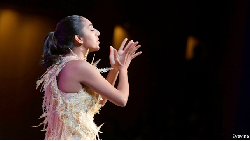November 2017 Culture and Society
Read the articles selected in November 2017
Humanismus darf keine Illusion sein
Source: Die Zeit, 19 November

Individual freedom is an illusion and a responsibility. The utopia of a tolerant and pacific world is the only place where humans have survived. The refugees remember us that nothing is to take for granted.
Read more:
http://www.zeit.de/freitext/2017/11/19/humanismus-utopie-gegenwart-nawrat/
L’invention d’une justice internationale
by Stéphanie Maupas & Rémy Ourdan La Haye
Source: Le Monde, 19 November
The International Criminal Court for the former Yugoslavia with its last process against the general Mladic, at the end of a relentless inquiry outside the rules, shows that the truth fights ethnic and religious hate. Only an international justice can create the conditions for a durable peace.
Wealth inequality has been increasing for millennia
Source: The Economist, 22 November

From a recent study based on the exam of archaeological sites turned out that in neolithic societies the wealth distribution was more egalitarian. With the shift to settled agriculture, especially in civilizations rich in domesticated mammals that could be owned, inequality rose steadily.
Enki Bilal atterrisage réussi
by Olivier Delcroix
Source: Le Figaro, 20 November

With Bug, the Serbian artist and film-maker comes back to the comic, telling a digital black-out which precipitates in the chaos our whole civilized world. A conversation between the visionary story-teller through images and the Nasa’s astronaut Jean- François Clervoy, both pioneers of a great human adventure.
The making of the “Psycho” shower scene
Source: The Economist, 2 November

A new documentary focuses on one of the most famous scenes in the history of cinema, the murder sequence from Hichtcock’s “Psycho”. The role of victim of a shattering murder played by a much-loved superstar and her nudity broke the rules of the conservative 1950s and signed the beginning of the horror-movie.
Abu Dhabi, l’anti-Louvre
by Philippe Dagen
Source: Le Monde, 14 November
The Louvre Abu-Dhabi inaugurates a new way of looking at the history of art. No more classifications or divisions between regions and ages, based on the assumption of the Euro-occidental superiority or centrality, but a universal principle, which extracts from every civilisation the same human desires and angsts.
Art et science, le choc des imaginations
by Catherine Mary
Source: Le Monde, 15 November

The complexity of contemporary questions requires a multidisciplinary approach. Humanistic and hard sciences after centuries of divisions end up again allied in many artistic and scientific projects that acknowledge the fruitfulness of their reciprocal interactions.
There is a way to recast sexual relations-and it starts with Venus
by Bettany Hughes
Source: The Guardian, 15 November

The history of Venus across millennia signs the evolution of our conflicted relations with sex and the beauty. From casus belli to incarnation of kindness and compassion the female body has never been irrelevant.
The strange afterlife of Antonio Gramsci’s “Prison notebooks”
Source: The Economist, 7 November

The Italian Cultural Institute in London is putting his original notebooks on display for the first time abroad. He was the Italian Marxist thinker who most influenced the left-wing movements in Europe outside the Soviet Union. The persistence of his analysis is rather in his intellectual vigour than in any doctrine.
Worauf können di Europäer stolz sein?
by Pawel Ukielski
Source: Die Faz, 6 November

The House of the European history is a museum in Bruxelles founded with the intention to promote a better understanding of our collective past. This critic of the cultural poverty and the neo-Marxist imprint of the institution invites to get back the European projects and discourses.
Read more:
http://www.faz.net/aktuell/feuilleton/worauf-koennen-die-europaeer-stolz-sein-15278563.html
La folle histoire du Louvre Abu Dhabi
by Bernard Géniès
Source: L’Obs, 2 November

The 11th November opens the Louvre Abu Dhabi, inaugurated by President Macron and the Louvre’s director Jean-Luc Martinez with the Emirate’s authorities. This partnership, born from an intergovernmental agreement after and despite the 11th September, is an extraordinary opportunity for the Western too.
Mothers of the Plaza de Mayo
Source: The Independent, 6 November
Since 40 years, the mothers of Plaza de Mayo have been gathering to protest outside the Presidential palace for their disappeared children. Their walking shook the most ferocious military dictatorships in Latin America. Every Thursday afternoon, they still ask for justice.
Une “bible” pour tout savoir sur “Blade Runner”
by Olivier Delcroix
Source: Le Figaro, 30 October
Published at first in a prestigious collection by the British Film Institute, the most detailed and complete essay ever written on the original masterpiece of Blade Runner by Scott Bukatman, a Stanford professor, has been just translated in French, after the apparition of Blade Runner 2049 by Denis Villeneuve.
Do social media threaten democracy?
Fonte: The Economist, 4 Novembre

The Internet has been the promise of better democracies, founded on a no longer mediated information which should have driven out corruption and lies. But instead of bringing a more enlightened civilisation, social media have spread disinformation and poison, corroding voters’ judgement and discernment.
Read more:
Meritxell Puig
by Justo Barranco
Source: La Vanguardia, 1 November
Barcelona is hosting the 23rd edition of the Manga Show, dedicated to the Japanese comic which has breathed a soul in the robots, making popular studies in robotics in Japan, and encouraging the Japanese to trust with these our creatures.
Rupi Kaur reinvents poetry for the social media generation
Source: The Economist, 1 November

Social media has helped her starry success, but it doesn’t define her poetry. After a deep decline in any literary experience reported by analysers, the secret of her popularity is her authenticity lacking a sense of authority, which captures the feeling of the new generations.
Read more:
https://www.economist.com/blogs/prospero/2017/11/insta-iambs
Info
- Pubblicato il : 04/12/2017 Modificato il : 04/04/2019

